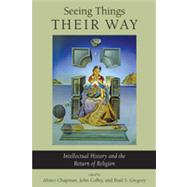
Note: Supplemental materials are not guaranteed with Rental or Used book purchases.
Purchase Benefits
Looking to rent a book? Rent Seeing Things Their Way [ISBN: 9780268022983] for the semester, quarter, and short term or search our site for other textbooks by Chapman, Alister. Renting a textbook can save you up to 90% from the cost of buying.
| Acknowledgments | p. vii |
| Introduction: Intellectual History and the Return of Religion | p. 1 |
| Can We "See Things Their Way"? Should We Try? | p. 24 |
| Quentin Skinner and the Religious Dimension of Early Modern Political Thought | p. 46 |
| "Sie Stinken Beide," or How to Use Medieval Christian-Jewish Disputational Material | p. 75 |
| Anti-Semitism, Philo-Semitism, Apocalypticism, and Millenarianism in Early Modern Europe: A Case Study and Some Methodological Reflections | p. 91 |
| Reflections on Persistent Whiggism and Its Antidotes in the Study of Sixteenth- and Seventeenth-century Intellectual History | p. 134 |
| Scholasticism Revisited: Methodological Reflections on the Study of Seventeenth-century Reformed Thought | p. 154 |
| The Changing Shape of Religious Ideas in Enlightened England | p. 175 |
| British Methodological Pointers for Writing a History of Theology in America | p. 202 |
| Intellectual History and Religion in Modern Britain | p. 226 |
| Response: The History of Ideas and the Study of Religion | p. 240 |
| Contributors | p. 258 |
| Index | p. 261 |
| Table of Contents provided by Ingram. All Rights Reserved. |
The New copy of this book will include any supplemental materials advertised. Please check the title of the book to determine if it should include any access cards, study guides, lab manuals, CDs, etc.
The Used, Rental and eBook copies of this book are not guaranteed to include any supplemental materials. Typically, only the book itself is included. This is true even if the title states it includes any access cards, study guides, lab manuals, CDs, etc.